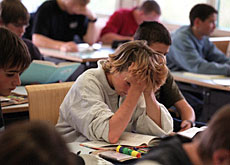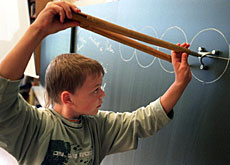Radicals push for national education system

Switzerland’s centre-right Radical Party wants to introduce a national education policy, to replace the current cantonal-based system.
Party delegates, who voted overwhelmingly in favour of the proposals at a meeting on Saturday, say they are prepared to force a nationwide vote on the issue.
The latest move comes one week after the end of a nationwide consultation period for existing plans to improve the quality of Swiss education.
The current proposals would introduce the so-called “subsidiarity principle” to Swiss education.
In other words, if the cantons are unable to agree on how to harmonise the 26 different existing systems, responsibility for doing so will pass to the federal authorities.
Switzerland’s main political parties all agree that reform is needed to make it easier for families to move between the country’s cantons – and to avoid “reinventing the wheel” not once, but 26 times.
“Lightweight” proposals
But the Radical Party describes the plans as too “lightweight”.
“The way they have been formulated is not sufficiently binding,” Sébastien Leprat, a party official, told swissinfo.
Leprat said there was no time to lose in the implementation of reform. He cited a 2001 study, carried out by the Organisation for Economic Cooperation and Development (OECD), which showed that the Swiss education system was losing ground in international terms.
The Radical Party is proposing a uniform national school system, which would include a return to universal grades, a standardised school age and more priority for language learning – particularly the country’s national languages.
The Radicals have made it clear that they will force a nationwide vote on the issue if their proposals are dismissed by the other parties in government.
“In 1974, a similar initiative was approved by the people, but not by [a majority of] the cantons. However, the cantonal position has now changed,” said Leprat.
No to centralisation
One person who does not agree with the Radical Party proposals is Gabriela Fuchs, spokeswoman for the Swiss Conference of Cantonal Ministers of Education.
Fuchs said the existing plans for reform addressed all the main issues, and she rejected the idea of a centralised school system.
“You have to remember that, in Switzerland, the compulsory school system is paid for 100 per cent by the cantons,” said Fuchs.
Thierry Béguin, also of the Conference of Cantonal Ministers of Education, said the plans would not work in Switzerland.
“Every attempt to centralise the system is an attempt to impose a Germanic model that takes no account of different cantonal sensibilities.”
Stefan Wolter, director of the Swiss Coordination Centre for Research in Education, also has his doubts.
“We don’t know if they are planning a new law, a federal education department or something else entirely,” he said.
Populist smell?
Nicolas Galladé, spokesman for the centre-left Social Democrats, agreed that education needed to be harmonised. But he claimed the Radicals’ proposals “smell of populism”.
The rightwing Swiss People’s Party has said it is generally in favour of a universal system of school grades.
But party spokesman Roman Jäggi pointed out that centralising the school system as a whole was “not a realistic idea and makes no sense”.
Matthis Behrens, director of the Institute for Educational Research and Documentation, believes a certain degree of centralisation should be possible.
In his view, however, the answer was not to transfer responsibility to the federal authorities, but to come to terms with differing educational traditions in the various linguistic regions.
swissinfo, Pierre-François Besson
Swiss education is organised at the cantonal level, meaning there is not one national system, but 26.
This makes it difficult for pupils and teachers to move between cantons.
It also creates problems in terms of common goals and the introduction of general principles, such as intensive language training.
The OECD’s Pisa study of international education systems ranked Switzerland seventh for mathematics.
However, the Swiss system was given a low score for science subjects generally – and Swiss pupils came only 17th in reading skills.
All Swiss pupils start school at about six years of age, and compulsory schooling lasts for nine years.

In compliance with the JTI standards
More: SWI swissinfo.ch certified by the Journalism Trust Initiative











You can find an overview of ongoing debates with our journalists here . Please join us!
If you want to start a conversation about a topic raised in this article or want to report factual errors, email us at english@swissinfo.ch.